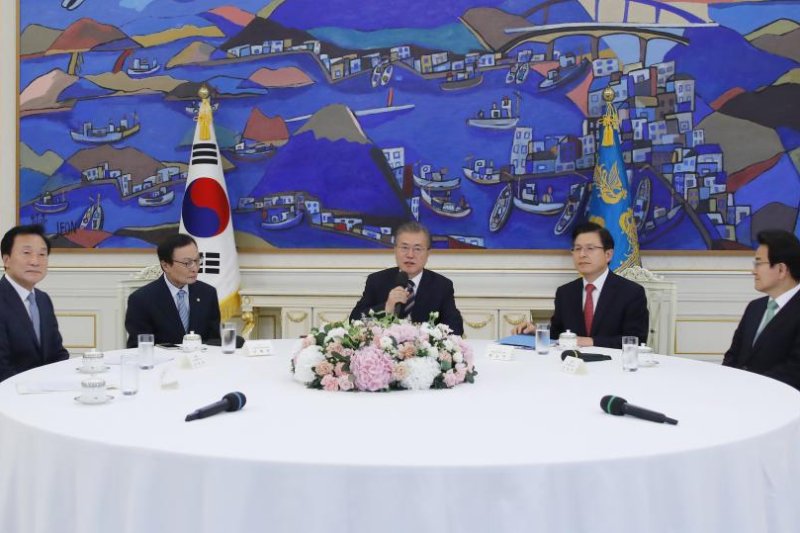South Korean President Moon Jae-in (C) speaks during a meeting with ruling and opposition party leaders about an ongoing South Korea-Japan trade conflict at the presidential office in Seoul on Thursday. Photo by Yonhap/EPA-EFE
July 18 (UPI) -- South Korea's presidential Blue House suggested Thursday a military intelligence-sharing agreement with Japan could come "under review" if Japan moves forward with more trade retaliation, according to a South Korean press report.
The issue may have been raised during President Moon Jae-in's meeting with the five main political parties represented in South Korea's national assembly, local newspaper Maeil Business reported late Thursday, local time.
The agreement known as Japan-Korea GSOMIA was the first bilateral military consensus reached between the two countries since the end of World War II. The deal was signed in 2016 under then-President Park Geun-hye. It has enabled Seoul and Tokyo to share military intelligence regarding North Korea.
Intelligence South Korea shares with Japan includes screening and video information collected by reconnaissance aircraft, and information obtained by intercepting wireless communication originating from North Korean military facilities located between Pyongyang and the military demarcation line inside the Korean demilitarized zone.
Japan may have benefited from the intelligence sharing, given the South's greater proximity to the Kim Jong Un regime; this week Japanese Foreign Minister Taro Kono urged South Korea to preserve GSOMIA.
South Korea's five political parties have also decided to establish a pan-national "emergency cooperation" body, Yonhap reported Thursday.
The decision comes in direct response to Japan's trade restrictions, targeting South Korean tech giants like Samsung and SK Hynix.
Japan's policy to delay the export of key chemicals to South Korea is designed to exclusively punish Korean companies. The measure comes after Japan said Seoul had damaged trust between the countries by raising the issue of forced wartime labor.
But Japan's restrictions could ultimately abet companies in China, where the government has been using technology to steal information from the United States and other countries.
The trade dispute is being noticed in Washington, where the U.S. House of Representatives has passed a resolution highlighting the importance of Japan-South Korea ties.
Japan may be reconsidering the restriction. By late Thursday, NHK reported Tokyo's trade ministry could "accelerate export approval" for the chemicals used in South Korea to make semiconductors.
Earlier on Wednesday, the top U.S. diplomat for Asia said the United States will do what it can to resolve the dispute, according to Yonhap.















